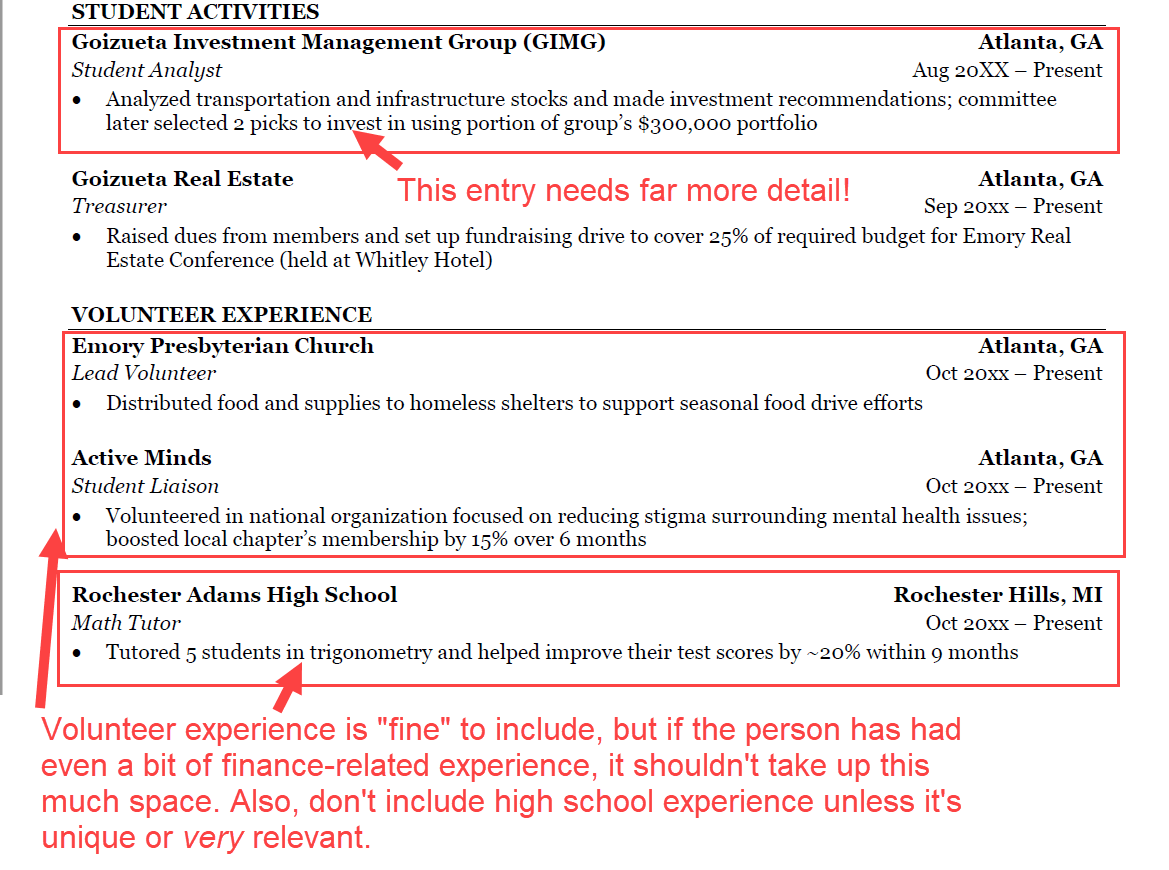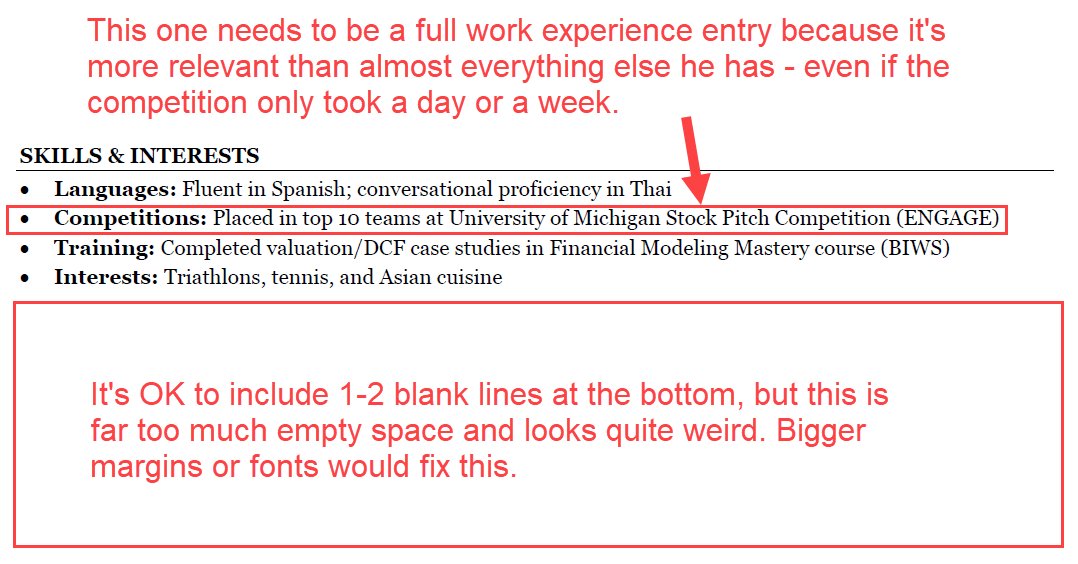How to Write a Finance Internship Resume with No Work Experience

There has always been a catch-22 with most finance jobs: to gain the right experience, you need the right experience first.
If you want an investment banking internship, you need a previous investment banking internship, usually at a smaller firm.
If you want a sales & trading internship, you need previous trading experience.
And as the recruiting process has moved up, this problem has gotten worse because you need these “pre-internships” even earlier to have a good shot at the large banks later.
You need to network to win these pre-internships, often using strategies like cold emails, and you also need a solid resume or CV.
But if you’re applying in your first or second year of university, you’re unlikely to have substantial work experience – probably just a mix of student activities, volunteer work, and side projects.
So, how do you write a resume or CV for a finance internship when you have no real work experience?
We’ll answer that question and go through a sample resume makeover in this article, but I want to add an important disclaimer first:
The “Finance Internship Resume No Work Experience” Strategy: Does It Work?
If you have no real work experience, you have to spin your activities, clubs, projects, volunteer work, and anything else into looking like “work.”
This strategy is useful if you’re:
- An early university student who’s applying for finance internships at smaller/local firms to gain experience; or
- A recent university graduate who did not complete internships and who now needs to find a job or off-cycle internship ASAP.
If you’re not in one of these categories, spinning non-work experience into looking like work experience will not work.
For example, with the 3rd year summer internships that lead to full-time return offers at the large banks, all the serious candidates will have had 1-2+ other internships by the time they apply.
You can spin your student clubs and hobbies as much as you want, but you will not be able to compete with someone who has already had two internships at smaller firms.
Finance Internship Resume No Work Experience: The Makeover
Here’s the example we’ll start with:
- Finance Internship Resume No Work Experience – BEFORE (DOCX)
- Finance Internship Resume No Work Experience – BEFORE (PDF)
And here’s the “After” version that we’ve revised:
- Finance Internship Resume No Work Experience – AFTER (DOCX)
- Finance Internship Resume No Work Experience – AFTER (PDF)
I don’t want to spend time explaining the formatting and style guidelines here, so I’ll assume that you’re using one of our existing resume templates (or a variation).
Even with these templates, though, many students write their own resumes and end up with something like the “Before” version above.
There are many problems, which I’ve highlighted in the images below:


How NOT to Write a Resume When You Have No Work Experience
The main issues here are as follows:
- Significant Blank Space At the Bottom of the Resume – You need to fill the entire page, even if this means changing the fonts and margins.
- Space is Not Allocated to the Most Important Entries – If you completed a spring week or a 1-day competition that was highly relevant, you should go into significant detail on it and minimize the less-relevant experience.
- Too Many Activities/Experiences Listed – Rather than listing 5-10 different activities and using one bullet for each one, pick the 2-3 that are the most relevant to finance and expand them by describing the specific projects/clients/deals you worked on.
- No Evidence of the Student’s Accounting/Finance/Other Skills – These small firms that might hire you for an informal or off-cycle internship do not have time to train you. Therefore, your resume must show evidence of accounting, financial, or valuation-related skills (and the equivalent if you’re interested in S&T, quant roles, etc.).
We addressed these points in the “After” version by:
- Deleting the Blank Space at the Bottom and Changing the Margins – We increased the top, bottom, left, and right margins and expanded a few of this person’s experiences while reducing or eliminating others.
- Going “All-In” on the Most Relevant Experiences – The student investment fund and stock pitch competition matter more than anything else, so we expanded them by listing the details of the person’s analytical work. The real estate club is “fine” but not worth adding much detail to, and the volunteer experiences should go to the bottom section.
- Providing Evidence of the Required Competencies – In addition to adding more detail for the stock pitch experience, we also linked to the person’s work on GitHub to add some credibility (NOTE: Before you do this, get some independent verification that your work is solid).
Some of the other changes are more subjective.
For example, we removed the high school math tutoring experience for space and relevancy, but we didn’t necessarily have to do this.
Especially if you did something impressive (e.g., won a national or international competition), you could keep high school experiences for your first year of university.
Another question is what to do with “menial jobs,” such as working in retail or at a gas station or a construction site or something similar.
This person does not appear to have any jobs like this, but if he did, we might leave in one of them.
Even if the job is not relevant to finance, it still helps because it shows that you can operate in a real work environment with other humans.
Enhancement Ideas for the “Finance Internship Resume No Work Experience” Strategy
You might look at this version and say, “But wait, you cheated! This person already had relevant experience; he just wasn’t presenting it well. What if I don’t have anything nearly as good?”
I would suggest the following ideas, in order of most to least viable:
- Student Clubs and Activities – These are usually the best choice if you do not have paid work experience. Even if an activity is not related to finance or investing, you could still list it if it’s in “business” more broadly (e.g., consulting, tech, or entrepreneurship clubs).
- Competitions and Events – In addition to stock pitches and bank-sponsored case competitions, you can also think about spring weeks in the U.K. or other “shadowing” opportunities you’ve had.
- Sports and Other Hobbies – These can also be useful, especially if you’ve been in a leadership position (e.g., team captain or coach) or you’ve managed the logistics or budget for the team.
- Volunteer Work – This one is lower on the list because most volunteer work is not that relevant to finance/investing careers. But if you did something related to the organization’s budget, fundraising, or member recruitment, by all means, list it.
- Side Projects or Freelance Gigs – Especially for sales & trading and other public markets roles, listing software or tools you developed for market analysis and posting the GitHub links can be a useful strategy. Look at the article on quant research for more on that one.
- Turn Class Projects Into Entries – For example, if you worked on a deal or investment recommendation in class or even something like an economic analysis of a public policy, you could potentially turn it into “work & leadership experience.” But this strategy is not ideal because everyone can take classes; it doesn’t show initiative in the same way.
- Certifications or Online Courses/Training – Rather than just writing that you completed Course X, it’s better to explain how you used the training to build something of your own, such as a presentation/pitch, Excel-based model, statistical model, software tool/utility, etc.
- Day Trading/Personal Account (“PA”) – This one can work, but it’s a little questionable even if you’re applying to sales & trading roles.
We probably get the most questions about this “personal account” idea.
If you’ve been day trading and have performed well over months or years, should you list your stats and explain your strategies?
It’s generally not a great idea for a few reasons:
- Traders don’t take it seriously – It’s so different from institutional-level trading at a bank that there isn’t much skillset carryover.
- If you haven’t had a real job, how did you get the money to trade? – The obvious answer is “from your parents.” While many people in finance come from wealthy families, you don’t want to draw attention to this point on your resume.
If you have nothing else, you can still list this type of experience, but don’t make it the focus of your resume.
We also get questions about “activities” like poker and other forms of gambling.
I would recommend against listing them as work/leadership experience; they can go in the bottom section of your resume if you are passionate about them.
Even if you’re applying to S&T roles, a trading algorithm, a new strategy you’ve developed, or simple code (Python, VBA, etc.) for market analysis would be more useful.
How to Apply These Strategies to Fix Your Resume When You Have No Real Work Experience
When you have to spin your experience heavily to write a decent resume, the most important points are:
- Be careful about your “results” – For example, avoid claiming that you earned $X from your stock pitches or investment recommendations. Keep it more open-ended and write about the process you went through because firms will be skeptical of overly impressive accomplishments from a 19-year-old student.
- Be able to back up everything you write – If you don’t know the details of one stock pitch (or any other project), don’t list it. It’s much better to explain one pitch, deal, or project very well than to list 2-3 extra items that you know little about.
- Understand this strategy’s limits – Spinning non-work experience into “work & leadership experience” will not get you summer offers at the bulge bracket or elite boutique banks, nor will it make you competitive with students from top schools who have had multiple internships.
The point of this strategy is not to level the playing field.
The point is to create a resume you can use to win an initial internship, either during the school year or over the summer, which you can leverage into bigger, better ones.
If you understand that, the finance job search becomes less of a catch-22 and more of a progression up the ladder.
A very long ladder that you need to start climbing very early, anyway.
Free Exclusive Report: 57-page guide with the action plan you need to break into investment banking - how to tell your story, network, craft a winning resume, and dominate your interviews




